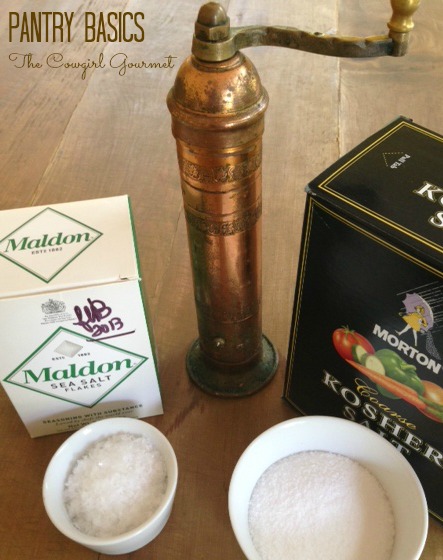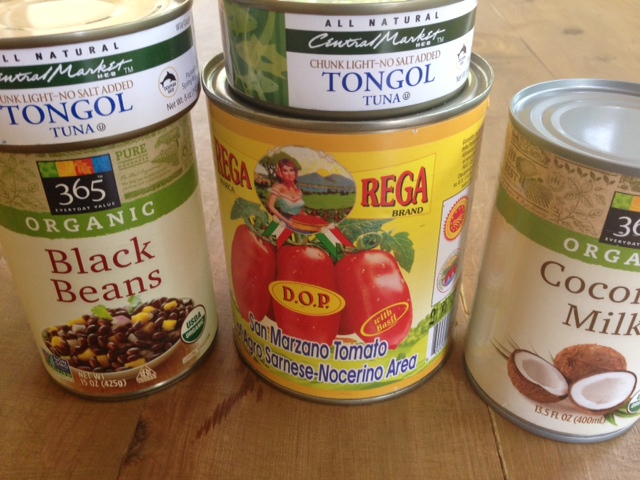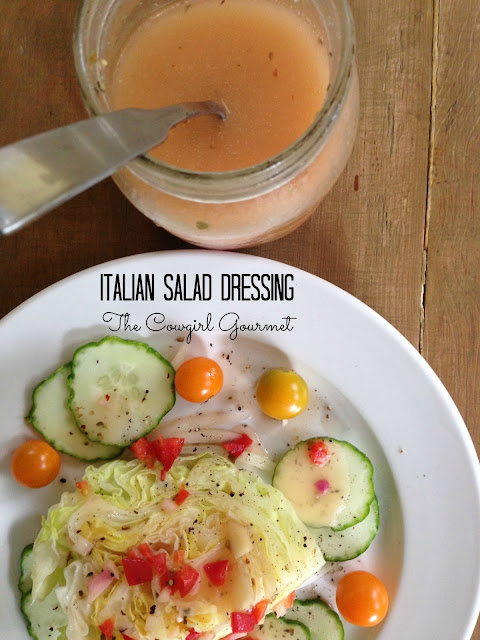Just the Basics
I spend a lot of time in the kitchen--both my own and the bakery where I make Cowgirl Granola--and with the growing popularity of this blog, people tend to ask me lots of questions about cooking.
Sure, I get the standard ones such as, "Do you use canola oil" and "How do you roast a chicken?" But I also get the more specific questions concerning how to best stock a pantry with the basics so even novice cooks will be ready for anything!
Several times, a friend of mine has suggested that we gather a group of friends together and let me go through one person's pantry identifying what they should keep and what they should throw away. This little session would be followed up with a tour of either Whole Foods, Central Market or other gourmet gorcery store where we walk the aisles and talk about what we should buy so that we are always prepared to cook at home--whether preparing an elaborate dinner for guests or just throwing together a quick dinner for the family.
While we have never successfully organized such an event, eating healthier and eating real food is on the mind of most people these days. Many of you are either just starting to cook or wanting to get better at it. To honor this, I have decided it's time to share some of the "essentials" I always have on hand and simply couldn't live (or cook) without!
Some of these are basic while others are more specialized, gourmet products. Some are health-driven, while others are "just because." The important thing to keep in mind is--if you want to cook at home--you need to have a well stocked pantry.
So, let's get started.
I also like to use balsamic vinegar, champagne vinegar (which is conspicuously missing from the image above, but it's on my grocery list) and sherry vinegar. While I am not a vinegar snob by any means, I do think everyone should have a nice aged balsamic vinegar available when the occasion calls for it.
Certainly, broth is an easy thing to make, but it does take time and patience which means sometimes a store bought variety is required. Just be sure and choose the organic, low sodium broths.
Stock secret--I love storing my shrimp shells in the freezer until I have a full bag and making shrimp stock. You can do the same thing with vegetable peels.
You know that we broke up with sugar a month or so ago and we're still mostly on the outs, but when we do need something sweet, here's what we reach for to add to our coffee, tea, banana pancakes, ice cream and more.
Sure, I get the standard ones such as, "Do you use canola oil" and "How do you roast a chicken?" But I also get the more specific questions concerning how to best stock a pantry with the basics so even novice cooks will be ready for anything!
Several times, a friend of mine has suggested that we gather a group of friends together and let me go through one person's pantry identifying what they should keep and what they should throw away. This little session would be followed up with a tour of either Whole Foods, Central Market or other gourmet gorcery store where we walk the aisles and talk about what we should buy so that we are always prepared to cook at home--whether preparing an elaborate dinner for guests or just throwing together a quick dinner for the family.
While we have never successfully organized such an event, eating healthier and eating real food is on the mind of most people these days. Many of you are either just starting to cook or wanting to get better at it. To honor this, I have decided it's time to share some of the "essentials" I always have on hand and simply couldn't live (or cook) without!
Some of these are basic while others are more specialized, gourmet products. Some are health-driven, while others are "just because." The important thing to keep in mind is--if you want to cook at home--you need to have a well stocked pantry.
So, let's get started.
- Maldon salt--This is a finishing salt and I am big fan. Use it once the food has been plated and before serving. At nearly $8 a box, David would like me to find something cheaper, but considering that a box easily lasts us four to five months (please note the date of Feb. 2013 on the box), it's not expensive at all--he just likes to complain when we buy it. Twice a year.
- Coarse kosher salt--I couldn't cook without coarse kosher salt. While the chefs prefer the Diamond Crystal brand, I buy the Morton's coarse kosher salt which can be found at any grocery store. Just to be clear, go ahead and throw that iodized crap away.
- Sea salt--David suggested I add sea salt to this list as well, and he is right. We have sea salt and use it, but kosher is my first choice. Plus, I have pink sea salt, smoked salt, Himalayan salt, fleur de sel, salt with herbes de Provence and more. I do recommend that you keep an assortment of salts on hand, especially now that there are so many options. The bulk sections in the upscale grocery stores generally have quite a few quality salts, so try a little bit and see if you like it.
- Freshly ground black pepper--Do yourself a favor...invest in a quality pepper grinder and your life will change. Well, maybe not, but if you want to cook and eat real food, freshly ground black pepper is a must.
Oils
- Grapeseed oil--Now that I no longer use canola oil, this is my go-to for cooking at high temperatures. It's also what I often use to make homemade mayonnaise.
- Frantoia--This is the really good stuff! I only use it for drizzling when I plate the food or for drizzling on top of salad greens. In San Antonio, I buy mine at Gaucho Gourmet, but any really good gourmet store or importer that caters to chefs will have it available.
- Extra virgin olive oil--We use a very reasonably priced $4.99 for 16.9 oz. Central Market brand extra virgin olive oil and we go through a bottle every 7-10 days. This is what we use for everything--salads, cooking, sauteing, etc.
- Coconut oil--If you haven't jumped on the coconut oil bandwagon, what are you waiting for? Loaded with medium chain fatty acids, coconut oil is good and good for you. I use it to bake, saute or whatever. In a pinch, you can even use it for a rich hair and skin moisturizer. Now, isn't that convenient?
Vinegars
I love vinegar but don't spend a lot of money on it. We use very moderately priced (some of them are downright cheap) red wine and white wine vinegar for everyday stuff like making homemade vinaigrette. America's Test Kitchen found that the best red wine vinegar is Pompeian and if Chris Kimball says this is the best, I'm good with that. I don't use Pompeian per se, but I don't spend big bucks on red wine vinegar either.I also like to use balsamic vinegar, champagne vinegar (which is conspicuously missing from the image above, but it's on my grocery list) and sherry vinegar. While I am not a vinegar snob by any means, I do think everyone should have a nice aged balsamic vinegar available when the occasion calls for it.
Canned Goods
I am not a canned food fan. Never have been. But there are those canned products that we just can't live without. Here are mine:- Tuna--We prefer the tongol no salt added variety for those times when you just need to make something quick to eat. A scoop of tuna salad in a lettuce wrap, with crackers or served on top of a beautiful salad has saved the day many times.
- Beans--We love the 365 brand of no salt added beans from Whole Foods. From black beans to garbanzos, we always have a few cans on hand.
- Tomatoes--You can never go wrong with whole San Marzanos. This is our favorite canned tomato variety and we also like to keep a smaller can of tomato puree in the pantry and a tube of tomato paste in the fridge.
- Coconut milk--This canned variety is rich and thick and can be used to make chia seed pudding in a snap, dairy-free ice cream, curries and the "coconut cream" can even be used to make dairy-free whipped cream.
- Anchovies--This was also David's addition and, he's right. Again. Anchovies or anchovy paste is vital. While you may not want to eat anchovies by themselves, they are required in Caesar salad and they can liven up a tomato sauce or even use as a topping for homemade pizza.
Butters and spreads
Please tell me that you don't have any fake butter or margarine in your fridge. If you do, just go ahead and toss it. Full of trans-fats, this is not the best choice. Here are some healthy and delicious real alternatives.- Earth Balance--This is our go-to choice. Made with a variety of different oils, it's what we choose to use when we don't need butter. Bonus...it's vegan.
- Melt--This is another vegan option. Made with coconut oil, flaxseed and other healthy oils, this plant-based organic buttery spread is delicious and heart-healthy.
- Coconut spread--I am a believer in the power of coconut, so forgive me. I love this new coconut spread made by Earth Balance. I use it to cook eggs in the morning, saute vegetables--whatever. There's barely a coconut taste and it's vegan.
- Kerrygold butter--But there are plenty of times when nothing but butter will do and that's when we pull out the Kerrygold. Made from grass-fed cows in Ireland, this is the real deal. Just make sure you get the unsalted variety.
- Almond butter--I'm lumping my new affinity for almond butter in this section, just because I think you need to love it as much as I do. If you have never tried almond butter, what are you waiting for? With the growing peanut allergy, this is a fun and tasty alternative. I like to buy it from Whole Foods, where they grind it on site and have it pre-packaged. Sometimes when I think I am hungry, I just have a spoonful of almond butter and all is right with the world.
Broths
Certainly, broth is an easy thing to make, but it does take time and patience which means sometimes a store bought variety is required. Just be sure and choose the organic, low sodium broths.
Stock secret--I love storing my shrimp shells in the freezer until I have a full bag and making shrimp stock. You can do the same thing with vegetable peels.
Condiments
What is life without good mustards, rich mayonnaise and ketchup? Honestly, our fridge is mostly stocked with condiments, leaving little room for much else.- Dijon mustard--This is a pantry staple for us since I constantly drop a bit into my homemade vinaigrettes.
- Yellow mustard--The cheaper the better. Really. What is egg salad without a squeeze of yellow mustard? This is why it should always be in your fridge.
- Coarse ground, artisanal mustard--This artisanal stuff can be used to make anything taste better. On occasion and for special requests, I make a chardonnay-tarragon mustard and sell it at the farmers market.
- Mayonnaise--I only eat homemade mayonnaise. Sorry, but it's true. I can make mayonnaise in less than 3 minutes. So can you. It is possibly some of the best mayo you'll ever have.
- Ketchup--I used to be a ketchup freak, really. But now that I have grown up, it's hardly on my radar. When it is, though, I only buy the organic Heinz ketchup.
Eggs
Farm fresh eggs are the only way to go. We buy ours from Parker Creek Ranch at the farmers market. The yolks are bright and orange and the eggs taste fantastic! Once you go farm fresh, you will never go back to cheap, industrially produced eggs again. And, that's a good thing!!
Sugars and Sweeteners
You know that we broke up with sugar a month or so ago and we're still mostly on the outs, but when we do need something sweet, here's what we reach for to add to our coffee, tea, banana pancakes, ice cream and more.
- Coconut palm sugar--This is my new go-to. Low on the glycemic index and considered a paleo sweetener, this is my first choice, but still please use this sparingly. The more we can reduce our sugar consumption, the better!
- Stevia--We also have this at home. It is fine for iced tea, but I do not like it in my coffee. I do not like stevia in my coffee, Sam I Am.
- Honey--Find a local beekeeper in your area and get a jar of locally produced raw honey. It will make you smile and it will help build your immune system. Bees are our friends.
- Maple syrup--Just splurge and get the real deal from Vermont which will cost you about $10 or more. It's worth it. If you feel like the pleasure of maple syrup but not the sugar, try the sugar-free maple syrup. Again, don't go crazy with either the real stuff or the fake, but it's what you should have in your fridge when nothing but maple syrup will work.
So, now you don't need me to come over and peruse your cabinets. You can do it yourself and purge and restock. Or applaud yourself for already having a pretty well stocked pantry.
I'd love to hear from you about what I didn't include here that is on your "pantry basics" list.
Buen provecho!











.JPG)

Comments